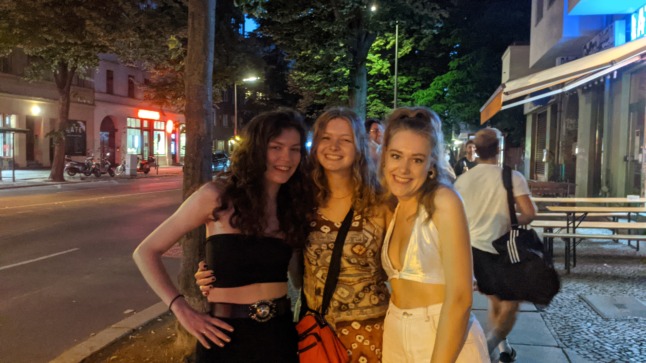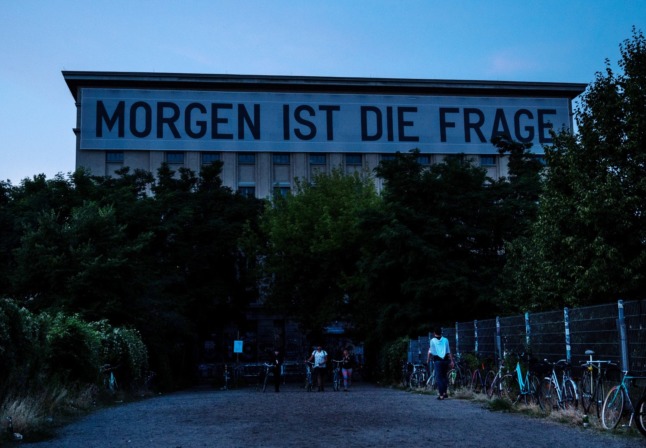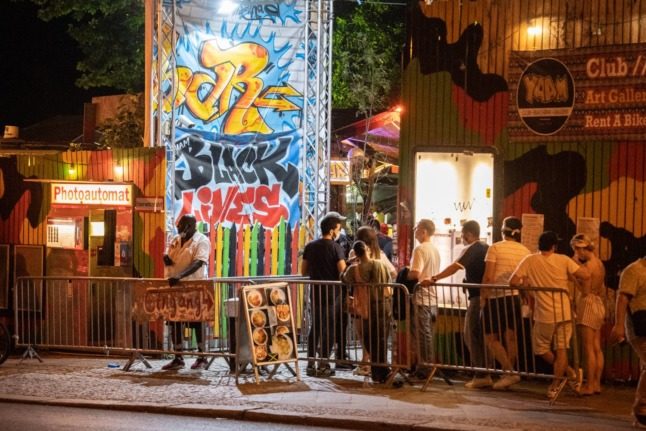Last Friday night, a friend and I dug out our ‘going out-out’ clothes from the back of our wardrobes and – dressed in the Berlin uniform of black-on-black – we braved the stormy weather and headed to Friedrichshain.
The area around Warschauer Straße station is a bit of a hotbed for electronic and techno clubs in Berlin. With Berghain, the city’s most famous club, just around the corner, the streets are usually swarming with slightly intimidating looking Berliners during the weekend. It has been strange to walk here over the last year – an area that is usually vibrating with music has been silenced, and has looked almost deserted each time I’ve passed.
My first post-lockdown experience of the party scene was, I must admit, fairly surreal. Our hopes for the night were dampened early on, and not only by the torrential rain that started pouring as we got off the U-Bahn. The club we had set our sights on appeared to have refashioned itself as a beer garden for the evening, and the atmosphere was a lot more civilised than we had been expecting.
READ ALSO: Berlin dancing ban ends: What you need to know
Reorienting ourselves and our expectations for the night, we dutifully joined the queue that stretched from the door of the club opposite, which was about 60 people strong. There is still a limit on how many people clubs can let in, so don’t expect to waltz straight inside and start dancing – queuing times can be up to a few hours at the most popular bars.

Entry requirements have stepped up a notch from the last time I remember queueing for a club. It’s not just your ID and five euro note you need to remember now, but also your mask, proof of a negative Covid-19 test or vaccination, and often a pre-bought ticket. Luckily at the club we chose, there was a pop-up testing station right next to the queue, meaning you could get your test and then have your result by the time you made it to the door.
READ ALSO: Berlin to relax more Covid-19 rules from Saturday
The spontaneity of a night out has definitely been lost amongst these new rules. Gone are the days when you could decide you fancied going out at midnight, meet your friend an hour later and march straight through the doors of your favourite club, the bouncer barely glancing at your ID. With most testing stations closing at eight or nine, you now have to start preparing a lot earlier in the day, and organisation is not necessarily something that lends itself naturally to the party mentality.
Dancing is not allowed…
Once my friend and I made it into the hallowed techno halls, we were told that under no circumstances would we be allowed to dance inside. Despite the music blaring so loudly we had to scream into each other’s ears all night – leaving me with that strained throat feeling I had long forgotten – if we even dared to move rhythmically to the music, we were swiftly confronted by a masked bouncer.
READ ALSO: German word of the day: Das Tanzverbot
The rules seemed to be that you could stand and chat on the dance floor, as long as you were wearing a mask but, if your movements started to resemble anything close to dancing, your fun would be halted pretty quickly by the hawk-eyed staff.
It was a very strange sight to see the clubs resurrected and pulsing with life, but this time with everyone’s main accessory being an FFP2 medical mask – mostly in black so as not to clash with people’s carefully chosen outfits.
I couldn’t help thinking how odd this would have seemed to us a year and a half ago, and I expect the sight would have looked fairly dystopian. This far into the pandemic, though, seeing everyone in masks simply made the experience feel that little bit safer. I know that, personally, I am not quite ready to return to the close, sweaty feeling of a pre-pandemic night out.

Despite the restrictions, our night was actually pretty enjoyable, and we were still able to be social until the (not so) early hours of the morning, making friends on the sofas and tables that now filled half of the dance floor.
Though this is definitely not a return to normal, I actually enjoyed some elements of the restrictions. Being able to take a rest by lounging around on the sofas, instead of tiring yourself out dancing all night, added a more social element to the experience.
My friend and I laughed afterwards that we had probably spoken more German over the course of that night than we had in the last few days combined. Almost everyone we met was local to Berlin and the conversations we had gave us a great opportunity to practice our language skills – this added an educational element to the night that we had not definitely not banked on.
It is still hard to say when the capital’s famous clubs will begin to feel ‘normal’ again but, for now, this reimagined version of a night out is definitely filling the Berghain shaped hole in many Berlin partygoers’ hearts.
READ ALSO: What it’s like to study abroad in Germany during a pandemic



 Please whitelist us to continue reading.
Please whitelist us to continue reading.
Member comments